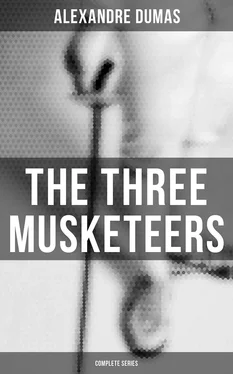D’Artagnan, entirely overcome by this terrible story, remained motionless and mute, while all the demons of anger and jealousy were howling in his heart.
“But, my good gentleman,” resumed the old man, upon whom this mute despair certainly produced a greater effect than cries and tears would have done, “do not take on so; they did not kill her, and that’s a comfort.”
“Can you guess,” said d’Artagnan, “who was the man who headed this infernal expedition?”
“I don’t know him.”
“But as you spoke to him you must have seen him.”
“Oh, it’s a description you want?”
“Exactly so.”
“A tall, dark man, with black mustaches, dark eyes, and the air of a gentleman.”
“That’s the man!” cried d’Artagnan, “again he, forever he! He is my demon, apparently. And the other?”
“Which?”
“The short one.”
“Oh, he was not a gentleman, I’ll answer for it; besides, he did not wear a sword, and the others treated him with small consideration.”
“Some lackey,” murmured d’Artagnan. “Poor woman, poor woman, what have they done with you?”
“You have promised to be secret, my good monsieur?” said the old man.
“And I renew my promise. Be easy, I am a gentleman. A gentleman has but his word, and I have given you mine.”
With a heavy heart, d’Artagnan again bent his way toward the ferry. Sometimes he hoped it could not be Mme. Bonacieux, and that he should find her next day at the Louvre; sometimes he feared she had had an intrigue with another, who, in a jealous fit, had surprised her and carried her off. His mind was torn by doubt, grief, and despair.
“Oh, if I had my three friends here,” cried he, “I should have, at least, some hopes of finding her; but who knows what has become of them?”
It was past midnight; the next thing was to find Planchet. d’Artagnan went successively into all the cabarets in which there was a light, but could not find Planchet in any of them.
At the sixth he began to reflect that the search was rather dubious. D’Artagnan had appointed six o’clock in the morning for his lackey, and wherever he might be, he was right.
Besides, it came into the young man’s mind that by remaining in the environs of the spot on which this sad event had passed, he would, perhaps, have some light thrown upon the mysterious affair. At the sixth cabaret, then, as we said, d’Artagnan stopped, asked for a bottle of wine of the best quality, and placing himself in the darkest corner of the room, determined thus to wait till daylight; but this time again his hopes were disappointed, and although he listened with all his ears, he heard nothing, amid the oaths, coarse jokes, and abuse which passed between the laborers, servants, and carters who comprised the honorable society of which he formed a part, which could put him upon the least track of her who had been stolen from him. He was compelled, then, after having swallowed the contents of his bottle, to pass the time as well as to evade suspicion, to fall into the easiest position in his corner and to sleep, whether well or ill. D’Artagnan, be it remembered, was only twenty years old, and at that age sleep has its imprescriptible rights which it imperiously insists upon, even with the saddest hearts.
Toward six o’clock d’Artagnan awoke with that uncomfortable feeling which generally accompanies the break of day after a bad night. He was not long in making his toilet. He examined himself to see if advantage had been taken of his sleep, and having found his diamond ring on his finger, his purse in his pocket, and his pistols in his belt, he rose, paid for his bottle, and went out to try if he could have any better luck in his search after his lackey than he had had the night before. The first thing he perceived through the damp gray mist was honest Planchet, who, with the two horses in hand, awaited him at the door of a little blind cabaret, before which d’Artagnan had passed without even a suspicion of its existence.
Table of Contents
Instead of returning directly home, d’Artagnan alighted at the door of M. de Treville, and ran quickly up the stairs. This time he had decided to relate all that had passed. M. de Treville would doubtless give him good advice as to the whole affair. Besides, as M. de Treville saw the queen almost daily, he might be able to draw from her Majesty some intelligence of the poor young woman, whom they were doubtless making pay very dearly for her devotedness to her mistress.
M. de Treville listened to the young man’s account with a seriousness which proved that he saw something else in this adventure besides a love affair. When d’Artagnan had finished, he said, “Hum! All this savors of his Eminence, a league off.”
“But what is to be done?” said d’Artagnan.
“Nothing, absolutely nothing, at present, but quitting Paris, as I told you, as soon as possible. I will see the queen; I will relate to her the details of the disappearance of this poor woman, of which she is no doubt ignorant. These details will guide her on her part, and on your return, I shall perhaps have some good news to tell you. Rely on me.”
D’Artagnan knew that, although a Gascon, M. de Treville was not in the habit of making promises, and that when by chance he did promise, he more than kept his word. He bowed to him, then, full of gratitude for the past and for the future; and the worthy captain, who on his side felt a lively interest in this young man, so brave and so resolute, pressed his hand kindly, wishing him a pleasant journey.
Determined to put the advice of M. de Treville in practice instantly, d’Artagnan directed his course toward the Rue des Fossoyeurs, in order to superintend the packing of his valise. On approaching the house, he perceived M. Bonacieux in morning costume, standing at his threshold. All that the prudent Planchet had said to him the preceding evening about the sinister character of the old man recurred to the mind of d’Artagnan, who looked at him with more attention than he had done before. In fact, in addition to that yellow, sickly paleness which indicates the insinuation of the bile in the blood, and which might, besides, be accidental, d’Artagnan remarked something perfidiously significant in the play of the wrinkled features of his countenance. A rogue does not laugh in the same way that an honest man does; a hypocrite does not shed the tears of a man of good faith. All falsehood is a mask; and however well made the mask may be, with a little attention we may always succeed in distinguishing it from the true face.
It appeared, then, to d’Artagnan that M. Bonacieux wore a mask, and likewise that that mask was most disagreeable to look upon. In consequence of this feeling of repugnance, he was about to pass without speaking to him, but, as he had done the day before, M. Bonacieux accosted him.
“Well, young man,” said he, “we appear to pass rather gay nights! Seven o’clock in the morning! PESTE! You seem to reverse ordinary customs, and come home at the hour when other people are going out.”
“No one can reproach you for anything of the kind, Monsieur Bonacieux,” said the young man; “you are a model for regular people. It is true that when a man possesses a young and pretty wife, he has no need to seek happiness elsewhere. Happiness comes to meet him, does it not, Monsieur Bonacieux?”
Bonacieux became as pale as death, and grinned a ghastly smile.
“Ah, ah!” said Bonacieux, “you are a jocular companion! But where the devil were you gladding last night, my young master? It does not appear to be very clean in the crossroads.”
D’Artagnan glanced down at his boots, all covered with mud; but that same glance fell upon the shoes and stockings of the mercer, and it might have been said they had been dipped in the same mud heap. Both were stained with splashes of mud of the same appearance.
Читать дальше












